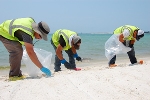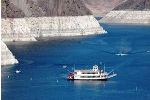Duke economist Martin Smith suggests the agency should also consider the potential health and environmental effects of salmon production that might stem from the fish's faster growth and less need for feed.
The government's peer-reviewed reports say the levels of dioxins created during controlled burns were below levels of concern.
EPA's nutrient criteria rule is set to be finalized Sunday; recently elected Florida leaders want more time to analyze the rule's effect on residents.

Jocelyn K. Scheffler, who worked in the command center during the the Exxon oil spill cleanup, says many qualified emergency response and hazmat experts were excluded from the Gulf spill cleanup effort.
The Vulnerability Self Assessment Tool and the Water Health and Economic Analysis Tool have been developed to help drinking water and other facilities assess their responses to threats and natural disasters.

U.S. Geological Survey scientists have not been able to isolate the cause of the highest rate of beak abnormalities ever recorded, particularly in birds in the Northwest and Alaska.
Offshore Vessels pleaded guilty in July to charges that its crew knowingly discharged oily wastewater from the bilge tank.
An Alliance for Zero Extention map poinpoints sites where endangered wildlife are located and could be used to identify places that need habitat protection.
The Fertilizer Institute and other agricultural groups are urged senators to stop S. 1816 because of its precedent-setting language.
The security zone will remain in please until October 2011, according to the U.S. District Court of New Orleans.
According to its designers, the green wall makes use of the vertical planting to save energy, lower greenhouse gas emissions, and create a new ecosystem.
Texas Tech researcher Moira Ridley said her experiments with strontium and nanoparticles of titanium dioxide revealed subtle differences depending on particle size.
In the latest settlement, the city will expand its system to reduce discharges of untreated combined sewage from about 35 per year to four or less.
The Department of Homeland Security released its Virtual USA information-sharing system early to help southeastern states keep abreast of activity in the Gulf of Mexico this spring.
Researchers from Virginia Tech's College of Natural Resources and Environment have received a $3.4 million grant from the Department of the Interior to study the effects of the Deepwater Horizon oil spill in the Gulf of Mexico on piping plovers -- shorebirds that have been listed as threatened since 1986.
NIOSH releases its evaluation of potential exposures and health effects of those involved in the Deepwater Horizon response activities.
The agreement will reimburse EPA Superfund more than $4.5 million, resolve nearly $1.2 million in natural resource damages assessment costs, and perform a removal action and restoration project.
EPA is inviting stakeholders to participate in listening sessions in Maryland, the District of Columbia, Virginia and Pennsylvania about proposed stormwater regulations.

As the seawater reverse osmosis industry has evolved and matured over the last 10 years, it is addressing concerns about energy efficiency and ecosystem impacts from concentrate discharge and seawater intake processes.